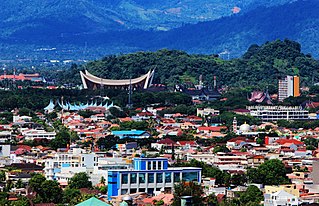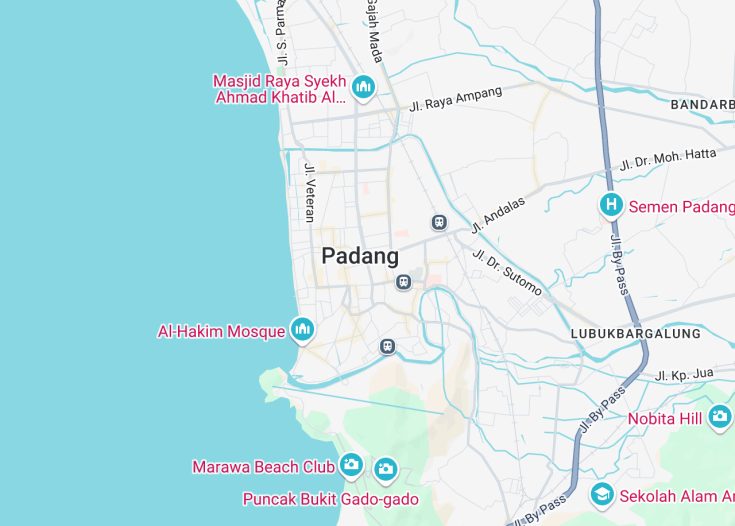Padang, a captivating city on the west coast of Sumatra, Indonesia, is a gateway to the island’s rich cultural tapestry and stunning natural landscapes. Known for its vibrant culinary scene—most notably, the globally recognized Padang cuisine—this city offers a unique blend of historical significance and modern charm. Visitors can explore colonial architecture, bustling markets, and pristine beaches. Padang also serves as an ideal starting point for adventures into the lush hinterlands and the Mentawai Islands, making it a compelling destination for both cultural and outdoor enthusiasts.
Ensure to visit the Adityawarman Museum in Padang to gain profound insights into the Minangkabau culture, which is pivotal to understanding the region’s unique matrilineal society.
Plan your visit between May and September to enjoy Padang’s tropical climate at its best, offering sunny days ideal for outdoor pursuits and exploring the nearby islands.
Top things to do & see in Padang
Select the following sights and activities to discover best tickets and tours available in Padang.
Explore the Vibrant Culture of Padang
| Country | Indonesia |
| Time in Padang | GMT+7 |
| Language spoken | Indonesian |
| Population | 1,000,096 (data from Statistics Indonesia) |
| Currency | Indonesian Rupiah (IDR) |
| Airports | Minangkabau International Airport (15 mi / 24 km). |
Padang, a city on the west coast of Sumatra in Indonesia, is an intriguing blend of historical influences and vibrant modern culture. Known for its beautiful beaches, delicious cuisine, and as a gateway to the Mentawai Islands, Padang holds a significant role in promoting regional tourism. Historical records trace back to the 16th century when it was a major trading hub during the Dutch colonial era. Enhanced by its unique Minangkabau culture, which is matrilineal and rich in traditions such as the colorful ‘bull race’, Padang offers visitors a distinctive cultural experience.
Where is Padang?
Located on the western coast of the Indonesian island of Sumatra, by the Indian Ocean.
Distances:
| Route | Distance by car (km) | Time by car (hours) |
|---|---|---|
| Jakarta to Padang | 1,200 km | Approximately 18-24 hours |
| Medan to Padang | 600 km | Approximately 12 hours |
What is Padang famous for?
Padang is most famous for its culinary tradition, particularly Padang food or Minangkabau cuisine, which is served in Indonesian restaurants worldwide. Its coastal location and significant historical sites also draw attention to this engaging city.
History
Ancient Times to 16th Century
Padang, located on the western coast of Sumatra, Indonesia, has a rich history that dates back to prehistoric times, as evidenced by the remnants of early settlements around the area. The region was part of the ancient Malay trading empire’s network, benefiting from maritime trade routes that connected the archipelago with the broader Indian Ocean world. The significant influence came from the spread of Islam during the 16th century, which transformed its cultural and social fabric.
17th Century to 19th Century
The 17th century marked the arrival of the European traders, with the Dutch establishing a trading post in Padang. It soon became an administrative hub for the Dutch East Indies Company, capitalizing on the lucrative coffee and spice trades. The Dutch influence expanded in the 19th century, further integrating Padang into global trade networks, laying down the colonial architectures and systems that partly define the city today.
20th Century to Present
Padang experienced significant growth in the 20th century despite challenges such as the Japanese occupation during World War II and later the struggle for Indonesian independence from Dutch colonial rule. Post-independence, Padang has faced various challenges, including natural disasters like earthquakes and tsunamis, but it has continuously strived towards recovery and modernization. Today, Padang is not only a testament to cultural resilience but also a center for economic and educational activities in West Sumatra.
Visit Padang
What to see and do in Padang, Indonesia
Padang, a hub of Minangkabau culture, offers a plethora of attractions and activities for visitors. Marvel at its architectural gems like the Adityawarman Museum, which houses Minangkabau artifacts and Dutch colonial history. Nature enthusiasts can explore the pristine beaches such as Pantai Air Manis, known for its folklore related to Malin Kundang. The city also serves as a gateway to the lush, unspoiled landscapes of West Sumatra, including Bukit Tinggi and the Harau Valley.
- Visit the Grand Mosque of West Sumatra with its unique buffalo-horn roof design.
- Trek through the Anai Valley waterfall, an ideal spot for nature lovers.
- Explore the local markets for traditional crafts and the famous Padang cuisine.
Festivals and Events in Padang
Padang hosts several cultural events that reflect its rich traditions. Notable among them is the Tour de Singkarak, occurring annually in November. This international cycling event attracts competitors and spectators from around the globe and showcases the region’s natural beauty. Another significant event is the Padang Food Festival, which happens in August, celebrating the city’s culinary delights and offering a taste of local culture through food.
Best time to visit Padang
The ideal time to visit Padang is during the dry season from May to September. The weather is more favorable, which makes it perfect for outdoor activities and exploring the natural attractions without the hindrance of rain.
Is Padang worth visiting?
Padang is undoubtedly worth visiting for its unique blend of cultural heritage, natural beauty, and culinary excellence. The city offers a deep dive into Minangkabau culture, which is evident in its architecture, traditions, and everyday life. Its proximity to some of Indonesia’s most breathtaking landscapes and its vibrant festivals make Padang a compelling destination for any traveler seeking to experience the richness of Indonesian culture.










